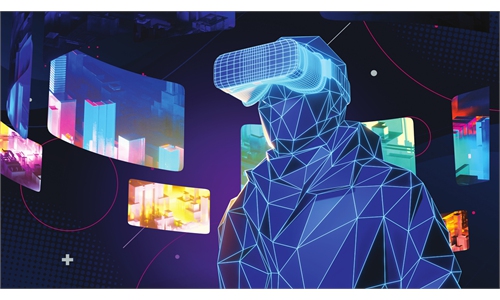China's Baidu launches metaverse app, as more firms join race in 'the next big thing'

Baidu's AI products showed at its annual AI developer conference held on December 27, 2021. Photo: courtesy of Baidu
Chinese internet giant Baidu on Monday officially took the wraps off its metaverse app, which was used to hold the company's annual developer conference, as more Chinese tech firms join the global race for supremacy in the next big thing in technology.
The Monday event is seen as the culmination of recent moves by major local internet firms that hope to establish a foothold in the hugely popular arena. A rivalry for a metaverse head start will be a battle that no one could afford to lose, be it an internet firm exploring new engines of growth or an economy eyeing future-oriented virtual strength, industry insiders said.
Nonetheless, the domestic push for metaverse prowess ought to awaken firms to a gap in bottleneck technologies, notably hyper-realistic digital humans, between homegrown offerings and their foreign counterparts, which renders local metaverse products largely entry-level models compared with especially US-origin line-ups, they noted.
Baidu, known for its expertise in artificial intelligence (AI) and autonomous driving, unveiled Xirang, literally "land of hope," at its annual AI developer conference.
The three-day conference, which opened on Monday, is available for attendance via Xirang, an app that enables up to 100,000 online participants to get up close with 100 speakers globally, according to the company, which claims it is the country's first metaverse conference.

A screenshot of Baidu's Xirang platform on December 27, 2021 when China's first metaverse conference is held in the virtual space. Photo: Li Qiaoyi/GT
The Xirang platform creates a Möbius strip-shaped virtual planet, on which participants can log in with their designated avatars and without a virtual reality (VR) headset - as mandated by Horizon Worlds, Facebook parent Meta's VR space.
The participants will be able to see, listen and interact with others using PCs, smartphones and wearables.
The new platform came across as an instant reminder of Meta's Horizon Worlds, which opened access to people aged 18 and above in the US and Canada starting December 9.
With the new platform, Baidu joins its domestic peers in carving out a path to the metaverse-powered future.
Earlier this month, domestic gaming giant NetEase released its metaverse-oriented next-generation internet technology framework and its software development kit for high-fidelity digital humans.
Among other Chinese internet giants that have flexed their metaverse muscles is Tencent, with its music arm's announcement on Friday to launch TMELAND, the first virtual music carnival in China, that's scheduled to kick off on December 31.
E-commerce giant Alibaba has also responded to the metaverse with a wholly owned subsidiary called "Yuanjing Shengsheng." The new unit, founded on December 6 with registered capital of 10 million yuan ($1.57 million), purportedly paves the way for Alibaba to expand into metaverse-based gaming.
The high-profile app epitomizes domestic internet firms' eagerness to gain an early foothold in the trendy technology that has swept across the world, Xiang Anling, a PhD candidate from the School of Journalism and Communication of Tsinghua University, told the Global Times on Monday.
Xiang was one of the authors of a concise yet informative report about the metaverse that was released in mid-September and has since become one of the most-cited Chinese metaverse manuals.
As an inevitable outcome of digital economic development, the metaverse is on course to become a major battlefield for innovation and virtual strength between countries, Yu Jianing, executive director of the China Mobile Communication Association Metaverse Industry Council, told the Global Times.
Yu termed the metaverse's development as essentially Web 3.0, or the innovative grouping and integration of various cutting-edge digital technologies such as cloud computing, distributed storage, VR, augmented reality, 5G, blockchain, and AI.
Yu expects the metaverse to empower the real economy with a broad-based upgrade, supporting the country's vision to become a global technology and innovation power.
Buoyed by such prospects, US social media giant Facebook rebranded itself as Meta in late October.
In a sign that the metaverse goes beyond the commercial sphere, Russian President Vladimir Putin said in November that people need to take advantage of meta-universe-enabled opportunities for communication and education, despite distance.
South Korea and Japan are among early-moving countries that have rolled out government-led initiatives to explore metaverse-generated growth.
Still, as Xiang pointed out, there's still some way off for domestic metaverse products to take on their US peers.
Take Xirang. Without a VR device, the app is arguably handier than Horizon Worlds. But the immersive world it creates is hardly on par with the VR gadget-mounted experience.
Technologies behind hyper-realistic humans, a vital part of the metaverse, remain in the grips of foreign heavyweights, according to Xiang.
Xiang called for more R&D expenditure in basic research, ending the focus on business model innovation that domestic internet firms have excelled at since the advent of mobile internet.
As one of the firms at the forefront of the domestic metaverse push, Baidu seems to be aware of the gap.
At a Xirang preview event on Tuesday, Ma Jie, a vice president at Baidu, said that development of the Xirang platform started last December and it could be at least six years before the app becomes fully deliverable, media reports said.
The metaverse remains in the very stage of industrial exploration and its development would be gradual, Ma said, noting that technology bottlenecks need to be broken to solve metaverse problems.
He enumerated secure, indigenous cloud computing technology and continued innovations in AI, edge computing, VR, AR and other areas as key technologies.





